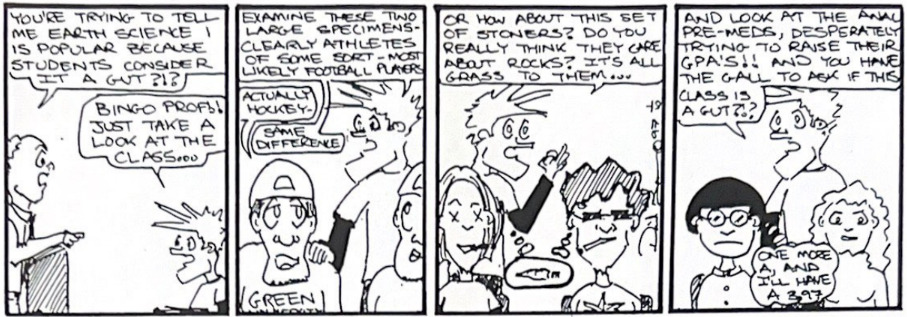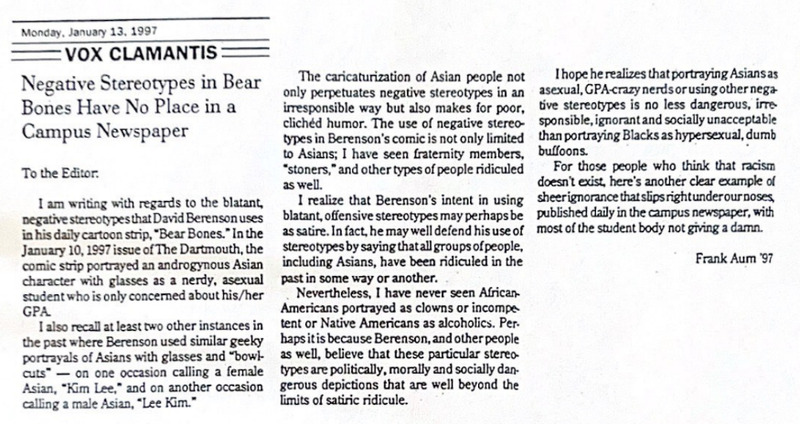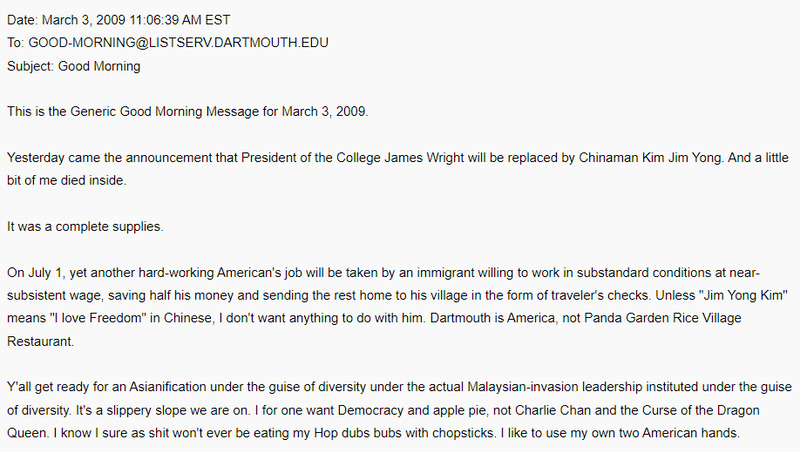Organizationally-Structured Incidents
Organizations have the power of having large campus outreach and their messages and events dictate a portion of what campus culture. This power is sometimes misused to perpetuate anti-Asian racism, and when organizations do not respond to these instances of hate, they are complicit in this racism, unwittingly or not.
Bear Bones: Satire or Racism?
The Dartmouth, or The D, is the College's daily student newspaper. The D features sections for cartoons, opinion, and editorial pieces that provide a platform for students to express their views on a variety of topics. These sections has seen a series of scandals especially regarding the matters of race and gender. The harms caused by stereotypes of Asians and Asian Americans are often ignored, empowering some non-Asian students to capitalize on these tropes in their work.
One such cartoon series was David Berenson '99's Bear Bones series which was intended as a satire of life at Dartmouth. Most of his characters were cardboard cutouts that personified a solitary character trade —being a "weedhead," for instance. The cartoon below featured an Asian student, whose given trait was that they were an "anal pre-med."
When the cartoon was published in the D, Frank Aum '97 was quick to respond.
“The caricaturization of Asian people not only perpetuates negative stereotypes in an irresponsible way but also makes for poor, clichéd humor...For those people who think that racism doesn't exist, here's another clear example of sheer ignorance that slips right under our noses, published daily in the campus newspaper, with most of the student body not giving a damn.”
– Frank Aum '97, "Negative Stereotypes in Bear Bones Have No Place in a Campus Newspaper" (DATE)
Berenson responded to Aum with a cartoon. He stood strong in his position that his work was simply satirical, not racist. In the quotation below, he explains what he thinks about the situation.
“I was surpised by Aum's letter, as I believed it was obvious that my use of stereotypes had always been seen as satirical, not racist. I decided to respond to Aum's accusations in cartoon form. I thought for a while about what I want to say regarding stereotypes, and then drew a cartoon. I showed the finished cartoon to my editor who thought it was a great response that illustrated clearly my feelings about stereotypes. Unfortunately, she was in the minority. When the cartoon ran the next day, I found that others on the campus interpreted the cartoon quite differently.”
– David Berenson '99, "Simply Un'Bear'able The Bear Bones Anthology", 1999
Overall, Berenson found that this was a learning experience but it is hard to say that campus climate change with a lack of structural support for Asian Americans such as an Asian-American issues dean.
Blarflex: Bear Bones Redux?
The cartoon series Blarflex by Alex Felix '08 and James Bleuer '08 published a comic in 2008 which played out similar tropes, as seen below.
It was released in the wake of a pending lawsuit by the Association of Alumni against the College's Board of Trustees. Bonnie Lam '10 was spearheading an anti-lawsuit movement among campus leaders. The comic contributed nothing to the debate concerning the lawsuit but rather, goes for the cheap racist jokes concerning the identity of the student who was pushed forward as a leader of a side in a contentious debate.
A Generic Anti-Asian Email to Incoming Dartmouth President
The Generic Good Morning Message (GGMM) was an email newsletter that mainly featured absurdist content at Dartmouth. The emails would have comments on the weather and trivia that seemed like it was written by a computer system or AI and narratives written by anonymous individuals. One such GGMM was in relation to the College's incoming president at the time, Jim Yong Kim.
Kim was to be the first Asian-American to serve as president of an Ivy League school. The message above was intended to be a satire of conservative suspicions that Kim had only been hired to increase diversity in administration on campus. However, this email instead generated outrage within Asian and Asian American groups on campus because of the insensitive and racist rhetoric contained in the message. This exposed many students that perhaps Dartmouth was not actually as accepting to an Asian president. With only a pseudonym to connect the email to, there was concern that nothing would be done.
In an excellent example of Transformative Justice in practice, Nora Yasumura and student interns in OPAL helped the writer understand the weight of their actions and turn a new leaf. While the greater Dartmouth public did not know who wrote the email (Out of respect for the person, this exhibit will also be keeping him anonymous), close friends of the writer sent him a personal message, inviting him to be educated on the impact of his email. Nora Yasumura recalls printing out various reaction emails from Asian students and having the student interns read them to the writer. From there, he became an active participant in the Diversity Peer Program, an OPAL program created by Nora which offered students training in addressing complex topics related to race/ethnicity/culture, gender identity, sexuality, religious difference, ability, and socioeconomic status. Although he wrote an apology letter, the overall campus, not knowing of his effort, was skeptical. Despite this, this person grew to be an advocate for diversity and equity in his fraternity and later in his professional life.
Half of Asian-American Athletes Dropped After Covid Budget Changes
In order to address financial burdens resulting from the Covid-19 pandemic, Dartmouth College announced that they would be eliminating five sports. This included men’s and women’s swimming and diving, men’s and women’s golf, and men’s lightweight rowing. But this cut would disproportionately impact Asian student-athletes, with half the Asian athletes in the school being affected by this decision.
In August 2020, more than a dozen Asian student-athletes signed a letter demanding that the Board of Trustees conduct an independent investigation into this decision. One student who signed the letter said that it indirectly showed that they are less valued than non-Asian athletes. The Board of Trustees received the letter, and was “carefully considering it”, according to a spokesperson. A group of student-athletes and their families created “Save Dartmouth Swim & Dive”, a group demanding for the reinstatement of the team and for the college to find other ways to address budget changes.
"This decision to cut these athletic programs is a threat to the integrity, diversity, and inclusiveness of the entire Dartmouth community, and they will have national implications, setting a precedent for athletic programs at other institutions to limit opportunities for people from marginalized and underrepresented groups."
(From the "Save Dartmouth Swim & Dive" Website)
The sports were eventually reinstated in January 2021 after the College learned that their disbandment might constitute a violation of Title IX . Title IX is a federal law that prohibits discrimination based on sex in university programs that receive federal funding. The efforts of the Asian student-athletes in face of a seeminlgy indifferent administration were impactful and should not be overlooked. Their efforts are a part of the continued effort by those of Asian descent on this campus to be seen and respected, and to have their concerns to addressed.





